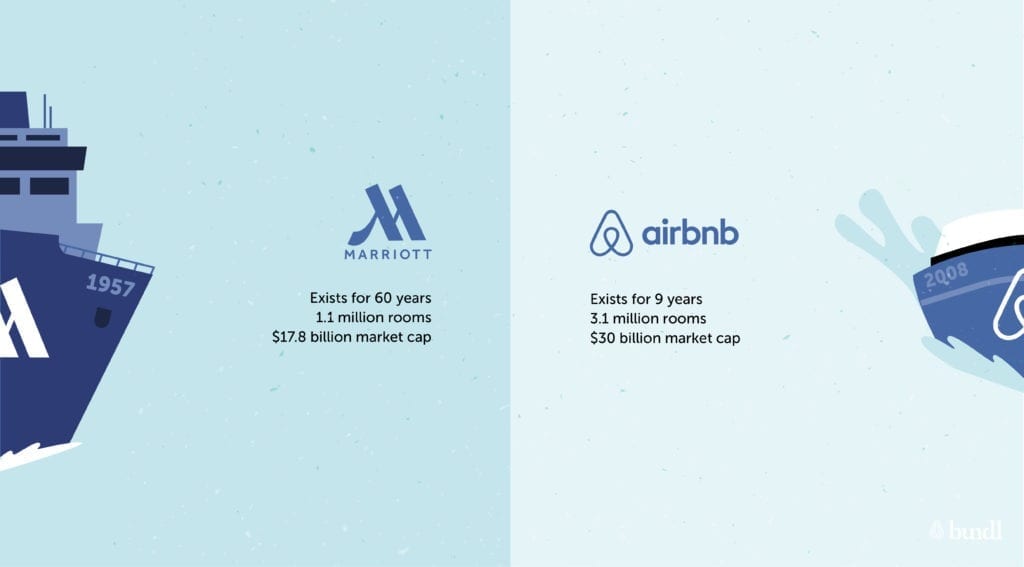Key takeaways
The speed at which markets are evolving due to innovation is at an all-time high. While startups are continuously trying to bring new value to the market, corporations are being forced to look beyond their trusted walls for opportunities to try and keep up with the challenging pace.
As of now, billion dollar startups (also known as unicorns) are sprouting out of the ground, drastically disrupting the industry they are active in. A few decades ago, a small startup would rarely pose a threat to a large corporation. But times have changed and now every startup showing promise already makes the big boys in their respective industry nervous. But why do these small teams pose such a threat to big corporates?
Why industries are changing, faster than ever
Ray Kurtzweil’s theory is a good one. His “law of accelerating returns” states that advanced societies tend to evolve even faster compared to less advanced societies. Every new invention sparks many opportunities for another, and before you know it a chain reaction occurs. It took us 70 years to go from the first airplanes in 1897 to a moon landing, and only 13 years from the first microprocessor to public commercialisation of computers.
The latter happened a little more than 30 years ago, and now (mostly thanks to computers and the birth of the internet) any driven entrepreneur with a bright idea can go to market at warp speed. Of course, many of them fail, but the few unicorns that succeed are bound to shake things up.
Apart from our ever-evolving society and the accessibility of knowledge on which we can build, the increasing growth rate and the threat startups pose towards corporates are fuelled by three trends:
- The acquisition channels startups use to acquire customers now address many more potential customers, and enable far more cost-effective marketing than twenty years ago. Again, thank you Internet.
- Purchasers of products, both consumers and enterprises, are much more inclined to buy products from startups than ever before. Advanced technology allows higher product quality compared to market standards at faster development rates, meaning higher quality for less time and effort.
- The private market investors are willing to invest in high-growth startups despite the greater losses sustained during most rapid growth. Startups today are growing faster than they have in the past. U.S. VC-backed startups in 1998 grew revenue 63% per year on average. In 2014, the median startup grew at 85% before going public.

You’ve probably already heard of the common examples. Airbnb ($30B) is worth twice as much as The Marriott hotel chain ($17B), reaching this peak in only nine years while The Marriott is an established brand of 60 years. And, although Airbnb offers a way to experience the local culture like a native while The Marriott fulfills the desire to be pampered, the impact of AirBnB on the hotel industry is undeniable. Add to that the fact that AirBnB does not own a single physical property and you start to grasp the hotel’s frustration.
Fighting a losing battle
But observing all this unicorn activity without many corporate dinosaurs reacting begs the question: Why do big corporates underestimate startups until they pose a real threat? Most mature enterprises recognise the need to anticipate trends, recognise weaknesses in their own ecosystem and broaden their market window. But the biggest obstacles to overcome when facing innovation are what many corporates see as signs of success: having a dominant brand, stable profits and market leadership. But when change is the only constant, sooner or later the dominant corporation will find it’s position challenged.

Finding your way forward
The best weapon against disruptive startups is corporate venturing. This can take many forms, all of which we will share with you in the very near future, but for now let’s leave it at this: Corporate venturing, at its most basic, is a financial investment with a larger company taking stake in a smaller company. Let’s look at it in another way: If the big company is your oil tanker, the corporate venture is like a speed boat, whose main purpose is to scout ahead for new opportunities. These speed boats come with a lot of benefits, but we went ahead and listed our top four:
The ‘speed’ in speedboat
Many large corporates perceive innovation as slow business. They require a newly nurtured mindset and a lot of movement in a restraining bureaucratic company structure. Time and effort simply cost a lot of money with no certain reward in sight. As a corporate venture, your small team is able to steer their course with more freedom, act quickly and more independently, and experiment with the opportunities ahead. This makes a lost speedboat inexpensive and easier to move forward from.
The next core business
The opportunity to operate freely also allows for new core businesses. Many fresh ideas in the company are written off as ‘not relevant, because it’s not our business’. Yet many large corporates are still clinging onto outdated activities that could soon be taken over by disruptive, unrelated businesses. Knowing that the average lifespan of a company in the S&P 500 index has decreased from 61 years in 1958 to just 18 years today, it is never a bad idea to start exploring alternate options for future growth.
Market window
When scouting for the future and discovering new options, you are forced to gradually learn about new and emerging markets. A wider market window is simply more ground to cover, requiring your employees to broaden their vision and gain new insights that can also be applied to your current market. Although this sounds like a challenge, it actually nurtures a curious mindset that allows your team to see the bigger picture.
Low risk & high reward
All of the above basically brings us back to the ‘risk/reward’ paradox, the strong suit here being the substantial reduction of risk, since you’re no longer steering your oil tanker into unknown territory. Launching new ideas to the market suddenly goes fast, becomes cheap and leaves room for error. Yet the reward, successfully executing an idea that strengthens your business, remains.
Corporate venturing is here to stay
Many corporates have already entered startup territory. Although some do it to boost their innovative image, learn lean methods or stay tapped into the network, many already recognise the pace set by the startups. They realise the pace will only grow faster and is here to stay, setting the stage for a game that has to be played.
If you liked our introductory post about corporate venturing, you can subscribe below to receive updates from Bundl in your mailbox. Stay tuned! A more elaborate slideshow can be found in our next blog about what exactly corporate venturing is.
---
Curious how corporate venturing can help improve innovation in your business? Check out our Venture Framework services or reach out.
7 strategies to future proof your business.
Learn all about the 7 fundamental things you can do to make your corporation “future-proof”.








